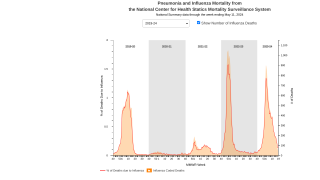Childcare Leaders Found Under-Vaccinated Against Influenza

According to a University of Pittsburg Medical Center (UPMC) study, child care centers in the USA seldom require the adults who care for children to receive the annual flu shot.
This new study published in the Journal of the Pediatric Infectious Diseases Society on December 12, 2019, found only 13.1 percent of childcare centers have a requirement for adult caregivers to be vaccinated against the influenza virus.
And, only 24.5 percent of childcare centers require a flu shot for children in their care.
This is unfortunate news since about 25 percent of children under the age of 5 attend some type of preschool program.
And, there have been 6 pediatric related fatalities already reported during the 2019-2020 flu season. Moreover, there were 143 pediatric fatalities related to influenza last flu season.
"When kids are in close proximity to each other in childcare centers they spread infectious diseases very efficiently," said study author Timothy R. Shope, M.D., MPH, of UPMC Children's Hospital of Pittsburgh, in a press release.
"The interventions that we use for older children and adults to prevent influenza, such as maintaining a distance of 3 feet between individuals, and coughing or sneezing into a shoulder or an elbow, don't work very well for a 2-year-old.”
“So the best way we can protect them is through immunization."
The transmission of influenza viruses to others may occur 1 day before symptoms develop and up to 5 to 7 days after becoming sick.
Dr. Shope continued to say "If we're concerned with the public health of children and preventing influenza morbidity and mortality, we have to legislate the issue."
This study reported only the states of Connecticut, New Jersey, Ohio, and Rhode Island have laws mandating flu vaccination for children in daycare.
Legislation that limits non-medical exemptions from childhood vaccination laws has advanced in several states in response to outbreaks of vaccine-preventable diseases, including measles, which suggests that there may be progress on this issue.
In the meantime, parents should take the initiative themselves.
"For parents, they don't need to wait until there is an influenza vaccination requirement for children in child care," Dr. Shope said. "They should do what is best for their child's health and get them immunized."
The Centers for Disease Control and Prevention (CDC) recommends influenza vaccination for everyone 6 months of age and older every flu season. The CDC has approved various flu shots, which can be researched on this webpage.
This CDC recommendation is because children are at a greater risk for serious complications from influenza, including hospitalization and even death.
Influenza vaccination cannot cause flu illness because the vaccines are made with inactivated and weakened viruses, or they only contain a single gene from a flu virus, which cannot cause illness.
‘There are many flu vaccine options to choose from. If you have questions about which vaccine is best for you, talk to a healthcare professional,’ says the CDC.
Recent flu vaccine news
- Seniors More Protected By Adjuvanted Influenza Vaccine
- Which Vaccines Are Required Before Grandparents Hold Newborns?
The CDC suggested on April 8, 2019, that employers ‘Take action to keep your workplace healthy this flu season. Consider offering free on-site flu vaccinations at your business locations.’
‘Making annual flu vaccinations part of your workplace wellness program offers many benefits to you and your employees.’
This UPMC study’s findings are drawn from a telephone-based survey, conducted in 2016, that included 518 directors across 48 states, randomly selected from a national database of licensed U.S. child care centers.
The study was funded by the CDC. No conflicts of interest were disclosed.
The Journal of the Pediatric Infectious Diseases Society is dedicated to perinatal, childhood, and adolescent infectious diseases.
Flu vaccine news is published by Precision Vaccinations.
Our Trust Standards: Medical Advisory Committee

























